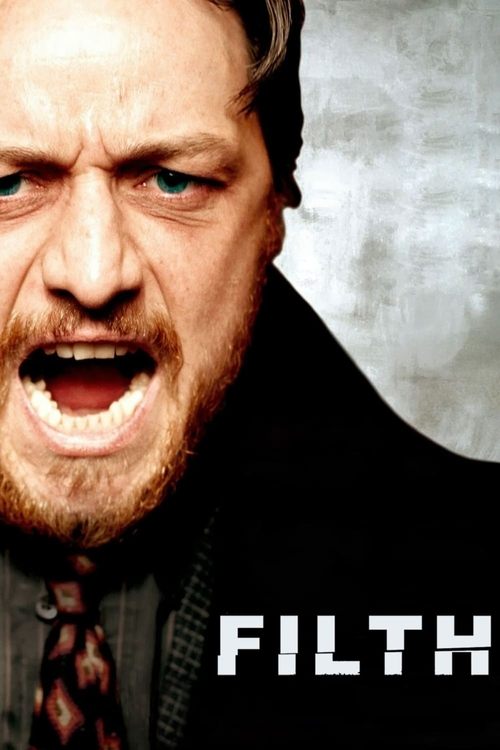
Title: Filth
Year: 2013
Director: Jon S. Baird
Writer: Jon S. Baird
Cast: James McAvoy (Bruce),
Jamie Bell (Lennox),
Eddie Marsan (Bladesey),
Imogen Poots (Drummond),
Brian McCardie (Gillman),
Runtime: 97 min.
Synopsis: A bigoted junkie cop suffering from borderline personality disorder and drug addiction manipulates and hallucinates his way in a bid to secure promotion.
Rating: 6.855/10
Shadows of a Shattered Self: Unraveling the Chaos of *Filth*
/10
Posted on July 21, 2025
James McAvoy’s portrayal of Bruce Robertson in Filth (2013), directed by Jon S. Baird, is a masterclass in embodying a man unraveling at the seams, a performance so visceral it anchors the film’s descent into psychological chaos. Adapted from Irvine Welsh’s novel, the film follows Robertson, a corrupt, drug-addled Edinburgh detective scheming for a promotion while spiraling into self-destruction. McAvoy’s ability to oscillate between charismatic menace and raw vulnerability is the film’s heartbeat, making Robertson both repellent and pitiable. His manic energy whether snorting cocaine in a precinct bathroom or manipulating colleagues with a serpent’s charm carries a tragic undercurrent, hinting at the trauma festering beneath his bravado. This duality elevates the film beyond a mere portrait of depravity, inviting viewers to grapple with the humanity of a deeply flawed man.
Baird’s direction is bold, embracing a frenetic visual style that mirrors Robertson’s fractured psyche. The film’s use of jarring cuts, surreal hallucinations, and a saturated color palette creates a disorienting atmosphere, though at times it risks overindulgence, veering close to stylistic excess. The Edinburgh setting is a character in itself grimy, rain-slicked streets and smoky pubs ground the story in a tactile realism that contrasts sharply with Robertson’s increasingly unhinged perspective. Cinematographer Matthew Jensen deserves praise for this balance, capturing the city’s stark beauty while amplifying the protagonist’s inner turmoil through tight close-ups and distorted angles.
The screenplay, also by Baird, adeptly condenses Welsh’s sprawling novel but falters in its pacing. The first half’s darkly comedic tone, driven by Robertson’s manipulative games, is gripping, but the shift to tragedy in the latter half feels abrupt, as if the film is racing to resolve its emotional weight. Supporting performances particularly Jamie Bell’s naive Lennox and Imogen Poots’ ambitious Drummond add texture but are occasionally overshadowed by McAvoy’s dominance. The score, blending gritty rock with haunting strings, complements the film’s tonal shifts, though it sometimes leans too heavily on cues to signal emotional beats.
Filth is not flawless; its ambition to juggle black comedy, psychological drama, and social commentary occasionally stretches it thin. Yet, its raw exploration of self-destruction, powered by McAvoy’s fearless performance and Baird’s audacious vision, makes it a film that lingers, forcing us to confront the fragile line between control and collapse.
0
0
